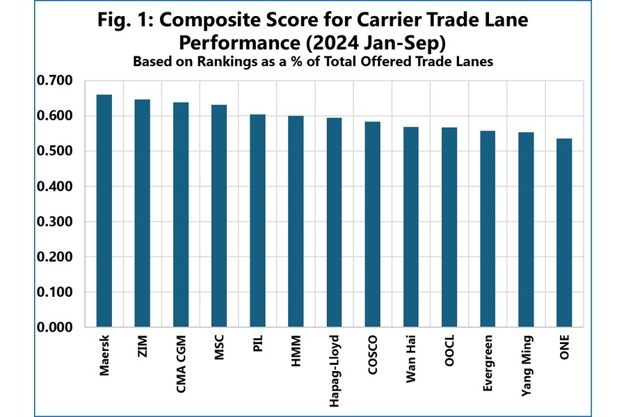Since 2019, the most reliable of the top 13 global carriers in each month, has rarely been the most reliable carrier in more than 30% of the trade lanes, that they offered a product in. For context, we benchmark schedule reliability across 34 trade lanes in our GLP report.
How is it then possible for a carrier to be the most reliable overall when they are not the most reliable in two-thirds of the trades they offer? The answer lies in consistency – these carriers were consistently in the top 5 of most reliable global carriers in 50%-80% of the trade lanes. Essentially, if they weren't 1st, they were 2nd or 3rd, and more often than not, no lower than the 5th most reliable on a given trade lane.
This is simple to understand every month but becomes complicated if you want to calculate relative schedule reliability performance over a longer timeframe. Who is the better performer – a carrier that is 1st in 50% of the trade lanes and 8th in 50% over 6 months, or one that is never 1st, but is 3rd in 100% of the trade lanes over that same period?
To quantify this for Jan-Sep 2024, we developed a composite score. For each global carrier, we calculated the percentage of times they ranked 1st, 2nd, 3rd, etc., on a trade lane. Every time they ranked 1st, they were assigned a score of 1.0, every time they ranked 2nd, they were assigned a score of 0.9, and so on, until a score of 0.1, which was assigned every time they ranked 10th on a trade lane. These scores were then added up, with the result shown in Figure 1.
Maersk was at the top of the composite rankings, having ranked 1st on a trade lane 16% of the time and within the top-3 44% of the time. ZIM followed, having been ranked 1st 17% of the time and within the top 3 39% of the time. CMA CGM, MSC, and PIL rounded out the top 5, while ONE was at the bottom with the lowest composite score. ONE was ranked 1st on a trade lane only 2% of the time and was within the top 3 30% of the time.
For more information:
Sea Intelligence
Email: [email protected]
www.sea-intelligence.com











